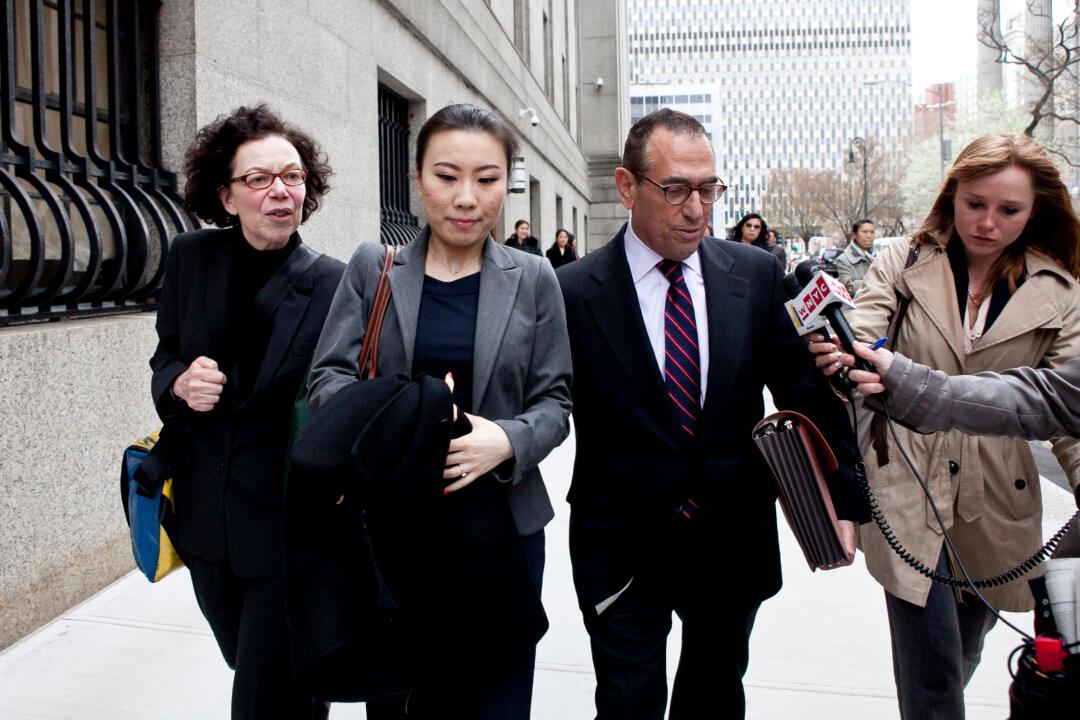NEW YORK—One of John Liu’s key aides, Sharon Lee, went through with her admission on April 25 that she offered to reimburse five contributors for Liu’s mayoral campaign.
She was the press secretary on Liu’s city comptroller campaign and regularly appeared next to Liu at events. Although she does not currently have a designated title on the Liu campaign, she has worked with Liu continuously since 2006.
Lee said that Liu learned that she offered to reimburse donors. She affirmed that she was not fired for this, and was instead offered a job on Liu’s campaign.
Lee was offered a nonprosecution agreement by the FBI, but declined it. When she began her testimony on Wednesday, Judge Sullivan excused the jury and warned Lee that since she is not under immunity, her testimony could be an admission to a crime.
When trial resumed on Thursday, the prosecutors honed in on her offers to reimburse donors, and on chats between Lee and Jia “Jenny” Hou allegedly referring to straw donors.
Hou was treasurer for Liu’s mayoral campaign. She is being charged alongside Xing Wu “Oliver” Pan for using straw donors—people who donate under the names of others—in order to dupe New York City to get public matching funds. Both Hou and Pan have plead not guilty.
One of the prosecutors, Justin Anderson, pressed Lee. She was shown one of the contribution forms used by the John Liu campaign. Anderson directed her attention to the legal area where the contributor has to sign, and Lee said she was aware the person who signs agrees that the funds are not reimbursed, and come from the person who signs.
Anderson referenced the five people Lee said she offered to reimburse. “If they had taken you up on the offer, you would have been encouraging them to lie on this form,” he said.
“Yes,” Lee answered.
Anderson elaborated, saying Lee would have encouraged them to say the money was their own, when it was not.
“Yes,” Lee answered again.
He then asked whether Lee knew what she was doing was wrong.
Lee avoided answering directly at first, saying she did not realize it was as serious as it was, yet as she was pressed by the prosecutor—and the judge—for a direct answer, she finally gave a solid “Yes.”
One of the key pieces of evidence brought up was a conversation Lee and Hou had over Google’s online chat service, GChat.
In transcripts shown in the courtroom, Lee and Hou are discussing cash contributions—which the Campaign Finance Board often discourages since they are difficult to track.
“so what if an unscrupulous committee got 100 people and had them all contribute 100 each? $10k! shady...” states Lee in the chat.
The prosecutor asked her questions to confirm what her chat message meant. Lee said it referred to cash contribution, which she said are risky because there is no paper trail. She said it would be “shady” if straw donors were used.
The specific line about the “unscrupulous committee” and “shady” donations was raised on Wednesday and Thursday.
The statement Lee made over GChat carries special significance to the case.
When jury selection was still underway on April 15, defense lawyers tried to prevent Lee’s testimony, arguing that Lee’s actions had no direct relation to Hou or Pan.
The prosecutors said there was evidence. They pointed out that Lee spent a week at Hou’s apartment to discuss the campaign, and both tried soliciting funds—and offered to reimburse funds—around the same time.
Judge Richard Sullivan ruled on April 15 that Lee could testify. He said there is circumstantial evidence that puts Lee’s actions in context to planning and coordinating with Hou.
During trial on April 25, Lee said the people she offered to reimburse included her mom and aunt. Both declined.
Hou’s lead lawyer, Jarold Lefcart, raised the point that Lee’s mom and aunt both live in California and would not have been eligible for public matching funds—which only applies to residents of New York City. Prosecutors, however, have shown evidence that some straw donors for Liu’s campaign were under different addresses in order to get matching funds.
During the trial, Lee also admitted that the Liu campaign took out ads in newspapers for some contributors “to thank them.”
She also admitted that a discussion between herself and Hou about covering the top portion of campaign contribution forms—parts with information that is not legally required—was intended both to protect the information from rivals, and to hide the information from the Campaign Finance Board.





